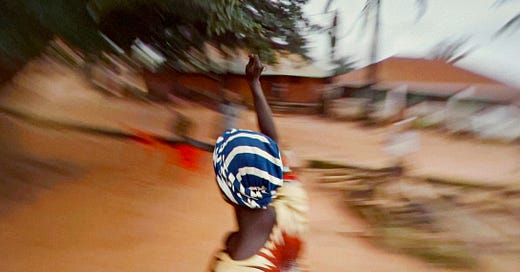Parsi (Eduardo Williams, 2019)
The first short I’ve seen from Argentine master Eduardo Williams, Parsi, is of a piece with his two features, The Human Surge and The Human Surge 3. A late 2010s heir to Gus Van Sant’s impressionistic films about wandering young men (Gerry, Elephant, Paranoid Park), The Human Surge and The Human Surge 3 combine image-warping technology such as Go-Pros and 360-degree cameras with globetrotting ethnography. These are films that speak to our digital present as well as the distorted lenses inherent in viewing cultures that aren’t our own. While the use of multiple locations was central in those features, the equally astonishing Parsi takes place in just one. To shoot the film, Williams gave a 360 degree camera to a queer community in Guinea Bissau. As the residents go about their daily lives, the camera might be tightly attached to a person’s torso, or it might swing wildly as if on a lasso.
Over this imagery, Williams plays a recitation of Mariano Blatt’s No Es (It Isn’t), a hypnotically iterative poem where each line begins with the word Parece (Seems Like). The poem is invigorating, in part because its endless form creates a ramping tension, and also because it’s hilariously queer. Lines such as “Seems like threesome vibes” or “Seems like an abstract dick” are placed alongside “Seems like a real phenomenon of phonic materialism”. Spoken without a break, the poem, like the spectacular imagery, undercut the film’s hangout movie intimacy (and rudimentary conceptions of ethnography).
Parsi is a film whose layers are purposefully separated, and the experience of focusing on the content of the poem, the movement of the imagery, and what’s actually happening onscreen is one that’s equally awe-inspiring and maddening. Through this artifice, the film has a fundamental sincerity. The 360-degree footage is astonishingly beautiful. It’s a maximalist, kaleidoscopic exaltation by and of the people of Guinea Bissau that eschews fetishistic colonial imagery in favor of pixelated, kinetic immediacy. Blatt’s poem, which strives to approximate the experience of life, is an inspiring encapsulation not just of art, but human relations. Placed together, Parsi captures the seductive incomprehensibility of life.
Parsi is streaming on the Criterion Channel




